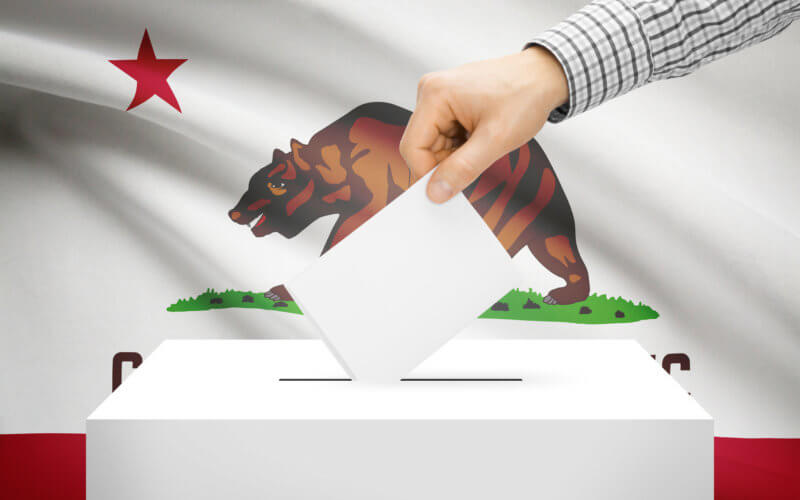
Recently, Sarah Hill, Cal State Fullerton professor of political science, reviewed each proposition on the 2022 California State Ballot. Learn what a yes or no vote would mean on each proposition.
“This year there are only seven propositions on the ballot,” said Hill. “We usually have many more. But let’s start by defining what a proposition is. There are three types. The first is an initiative. This is created by voters who have 180 days to collect 623,212 signatures (or 5 % of the last vote for the governor). If the goal is a constitutional amendment, that requires almost one million signatures, which is really hard to do. These types of propositions are usually paid for by folks who want it on the ballot because they have a vested interest. Once a proposition is passed, it becomes law and the only way it can be changed is by another proposition that alters it.

“The second type of proposition is a protest referendum, in other words, overturning a law passed by the legislature. In order to get this on the ballot, supporters will need to collect 623,212 signatures in 90 days. That’s pretty hard to do within that time frame, so you don’t see many of these.
“The third type is a legislative referendum. This is a law passed by the legislature automatically goes to the voters for their approval. Examples of this include bonds, constitutional amendments and changes to previous propositions.”
So how do you know who is backing different propositions? Who worked to get this on the ballot?
Hill recommends a few sources of information:
- Voter’s Edge (League of Women Voters)
- Cal Matters (nonpartisan, nonprofit journalism)
- The Official Voter Information Guide (California Secretary of State)
- California Legislative Analyst (nonpartisan analysis)
Proposition 1: Constitutional Right to Reproductive Freedom
- Expressly places a right to reproductive freedom in the California Constitution
- Current California law provides for right to privacy in personal reproductive decisions, including the right to choose an abortion and to choose or refuse contraceptives
- This would amend the California Constitution to expressly include these rights
- This is a direct response to Dobbs (overturning Roe v. Wade)
- No direct fiscal impact
“This isn’t a major change since abortion is legal in California but the goal is strengthening the existing laws regarding access to abortion,” Hill said. “A yes vote changes the California Constitution to expressly include a right to reproductive freedom, including the right to choose an abortion and to choose or refuse contraceptives. A no vote signals no change to the California Constitution, so existing law will provide a right to reproductive freedom.”
The League of Women Voters and Democratic Party of California favors this. The Republican Party of California opposes this.
Proposition 26: Legalizes In-Person Sports Betting at Tribal Casinos and Horse Racetracks
- Legalize sports betting, roulette, and dice games in tribal casinos and horse racetracks; these are currently illegal in California
- 10% percent tax on net betting
- Revenue after cost of regulations — 70% to General Fund, 15% to gambling addiction programs, 15% to Department of Justice for enforcement
- Net gain in state revenue potentially tens of millions of dollars annually
“The different sides of Proposition 26 and 27 have spent over $400 million on these, so you can guess is a lot of money at stake,” Hill said. “A yes vote would legalize in-person sports betting in California. A no vote means it would remain illegal.
“What’s interesting is that there are two gambling propositions on the ballot with different Native American tribes involved. There is concern that this would not be well-regulated,” she continued. “Gambling addiction is a serious problem and we need to be careful about this. In theory, the tribes are sovereign nations…but they must negotiate with states. Is this well-structured? Well-regulated? I should note that it would be a benefit for these tribes.
“Passage would allow more types of gambling to be available. Tribes already have slot machines and card games, and this would allow them to have new kinds of gaming,” Hills said. “And although money would come back to the state, the concern is that it would not be enough to fund gambling addiction programs. Are they setting up people for gambling addiction?”
The League of Women Voters has no position on this, the Democratic Party of California is neutral and the Republication Party of California opposes this proposition.
Proposition 27: Legalizes Online Sports Betting
- Allows tribes and affiliated businesses to operate online sports wagering outside of tribal land
- Currently sports betting is not allowed in California
- 10% tax on net betting
- Revenue after costs of regulation — 85% for homelessness and mental health programs, 15% to tribes without sports betting
- Provisions limit competition from smaller companies/startups
- Net gain in state revenue potentially hundreds of millions annually
“Some of the controversy over this is that out-of-state companies can partner with a tribe but will take money out of the state. There are only a few major players who could come in and do this. This could be a net gain in revenue to California, but this could also greatly increase gambling addiction, particularly with young men,” Hill said.
“If it passes, this will allow tribes and tribal affiliated businesses to operate online sports betting outside of tribal lands. A no vote means online sports betting will remain illegal in California.
“So what happens if both Prop. 26 and 27 pass and they contradict each other? Which is law? The one that gets the most ‘yes’ votes wins. They may not conflict, but if they do, it could end up in court. There is already competition between them. If you go to votersedge.org, you can see the top supporters paying for this on each side.”
The League of Women Voters has no position on this. Both the Democratic and Republican parties of California are against it.
Proposition 28: Provides Additional Required Funding for Arts and Music Education in Public Schools
A yes vote means the state will set aside additional revenue specifically for K-12 arts and music education, about $1 billion annually.
A no vote means there is no change in funding of California’s public schools.
“This is a tough one because nobody wants to be against adding more arts and music studies to schools,” Hill said. “Here’s where it gets tricky. The state is required (by Prop. 98) to set aside funding for K-12 and now an extra 1% would have to be added for music/art. Of this funding, 80% would be reserved for hiring/supporting new teachers with the amount of money to be distributed based on enrollment. Schools serving low-income students would receive additional funding. There would be an increased state cost of about $1 billion annually but there isn’t a revenue stream for this so the money would have to come out of another area of the state budget. The question is, who will lose money? Where are we cutting? In a recession, what if the legislature would rather use these funds to feed children? They can’t divert it if this becomes the law.”
The League of Women Voters is neutral, the Democratic Party of California is for a yes vote and the Republican Party of California is neutral.
“There is no organized opposition,” Hill said. “Nobody wants to be in a position where they say no to music and art.”
Proposition 29: Dialysis Clinic Staffing Regulations
- Requires a licensed medical professional to be onsite during dialysis treatment
- Clinic must have at least one doctor, nurse practitioner or physician assistant present during all treatment hours
- Currently, doctors must see the patient at least once a month
- Additional operating regulations
- Cost in low tens of millions annually
“Yes, this is the third time since 2018 that we’ve seen this,” Hill said. “This failed in 2018 and 2020. Why does it keep coming back? Many believe that a labor union, Service Employees International Union-United Healthcare Workers West, wants to unionize dialysis clinics. Dialysis is a lifesaving measure. There are two primary players in this industry (outside of hospital clinics). These two clinics don’t always have the best track record but are more regulations needed? And would this kind of regulation help? No other state has this regulation. It’s not clear that this is the answer to the problems. Opponents say the clinics already have the needed staff and while this may need attention, it should be decided by the legislators, not the union.
“Clinics are overseen by a doctor but they are not always onsite at all times.
“I think the proponents know that Californians are tired of hearing about this,” Hill continued. “There are fewer commercials being shown this time around. Proponents claim that without passage, clinics will shut down. That has not been proven. The issue might be a lack of staffing for this.”
The League of Women Voters is neutral on this. The Democratic Party of California is in favor of it and the Republican Party of California is against it.
Proposition 30: Tax to Reduce Air Pollution and Prevent Wildfires
- Tax on millionaires to support electric vehicles and prevent wildfires
- Personal incomes over $2 million will be taxed an additional 1.75%; funding would be applied as follows: 45% to promote purchase of zero-emission vehicles (ZEVs), 35% to increase ZEV infrastructure (such as charging stations), and 20% to wildfire suppression and prevention
- Would raise $3.5 billion to $5 billion per year
- Supported by Lyft, environmentalists and some labor unions
“The controversy around this is that Lyft and Uber are big proponents,” Hill said. “They need to switch to 90% of their miles being logged by electric vehicles by 2030 and these vehicles are expensive. Lyft is using this to help get these vehicles,” said Hill.
“The state needs to get more serious about this issue if they’re going to require or promote electric vehicles. The concern is that this plan is being forced on us by Lyft. We know that the price of electric vehicles will go down over time but there’s a huge infrastructure that needs to be built. There is also concern about the electrical grid. Could it support all these new vehicles requiring electricity? Where is that electricity going to come from? This may be an aspirational goal of the legislature who might extend or change things along the way.”
League of Women Voters stays neutral, Democratic Party of California says yes (Newsom says no) and the Republican Party of California says no.
Proposition 31: Would Allow the Sale of Flavored Tobacco Products
(This is a protest referendum based on a 2020 law that prohibited the retail sale of certain flavored tobacco products. Passage of this proposition that would overturn the law.)
- Referendum on 2020 law that prohibits in-person stores and vending machines from selling flavored tobacco products
- Tobacco companies funded this protest
- Fine of $250 for each violation
- Costs $100 million in lost revenue last year
A yes vote keeps the law in place. A no vote overturns the law.
“As you can imagine, tobacco companies do not like this law,” Hill said. “Their argument for overturning the law is that tobacco is already regulated for teenagers so why not let adults get flavored tobacco? Or might it encourage a black market of flavored tobaccos?
“Those in favor of leaving the law as is, argue that the goal of tobacco companies is to get teenagers hooked on nicotine and their concern is that by not providing flavored tobacco, teenagers are discouraged from smoking.”
League of Women Voters and Democratic Party of California encourage a yes vote; the Republican Party of California encourages a no vote.